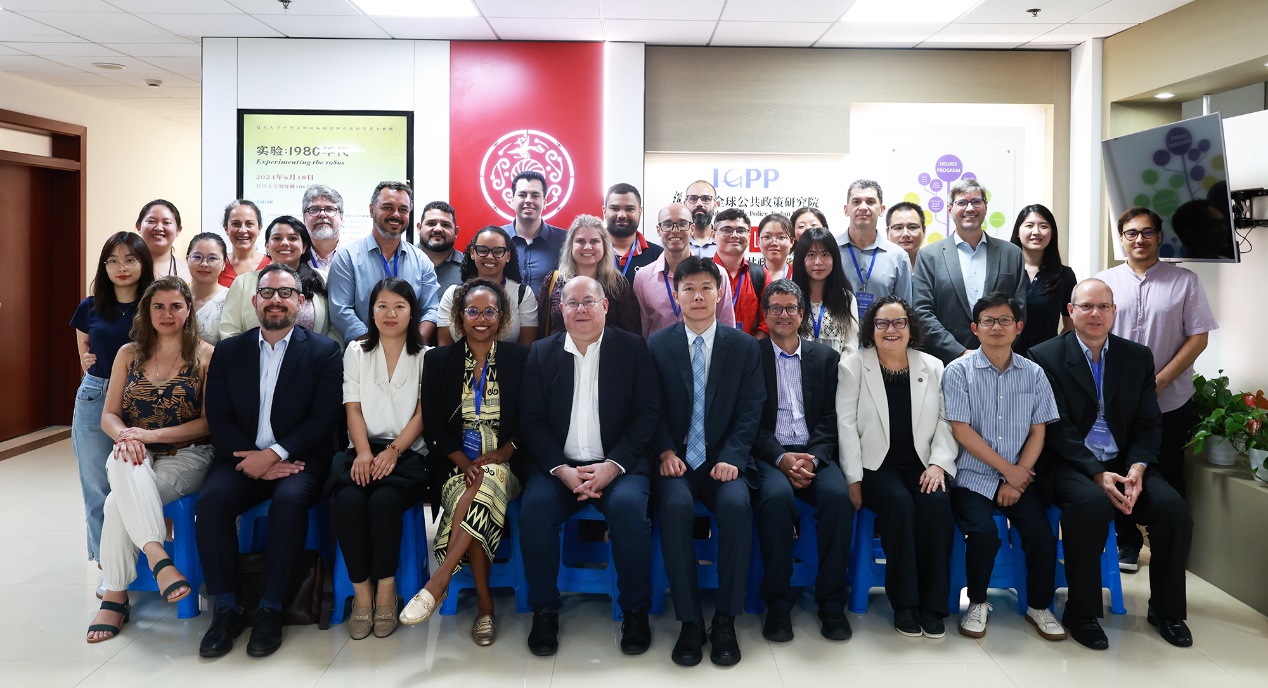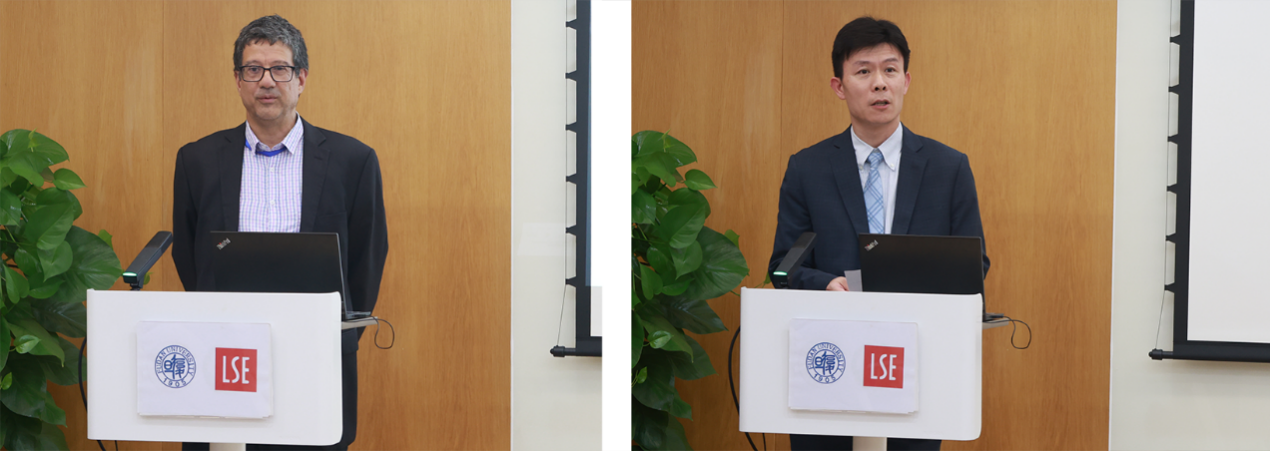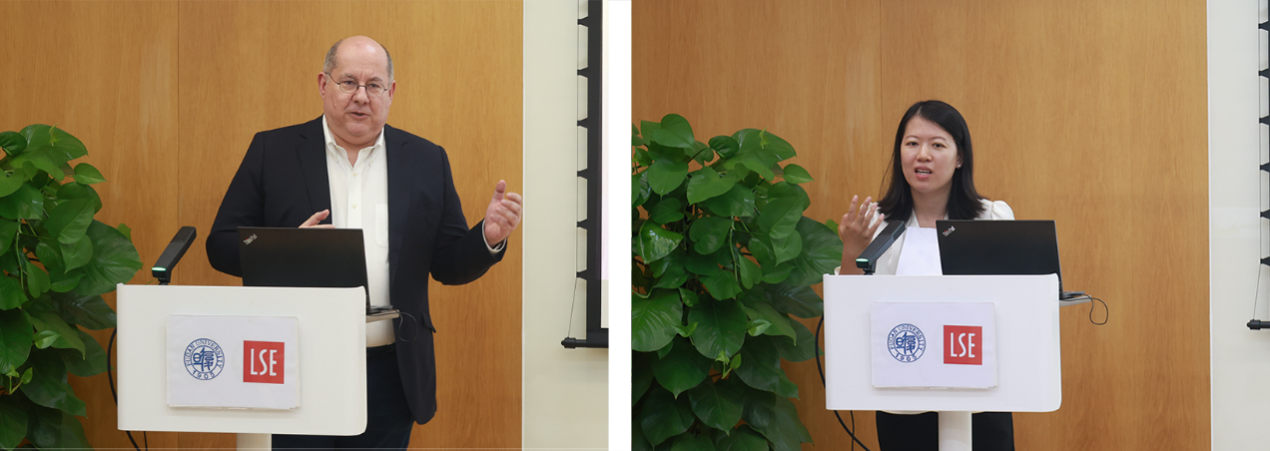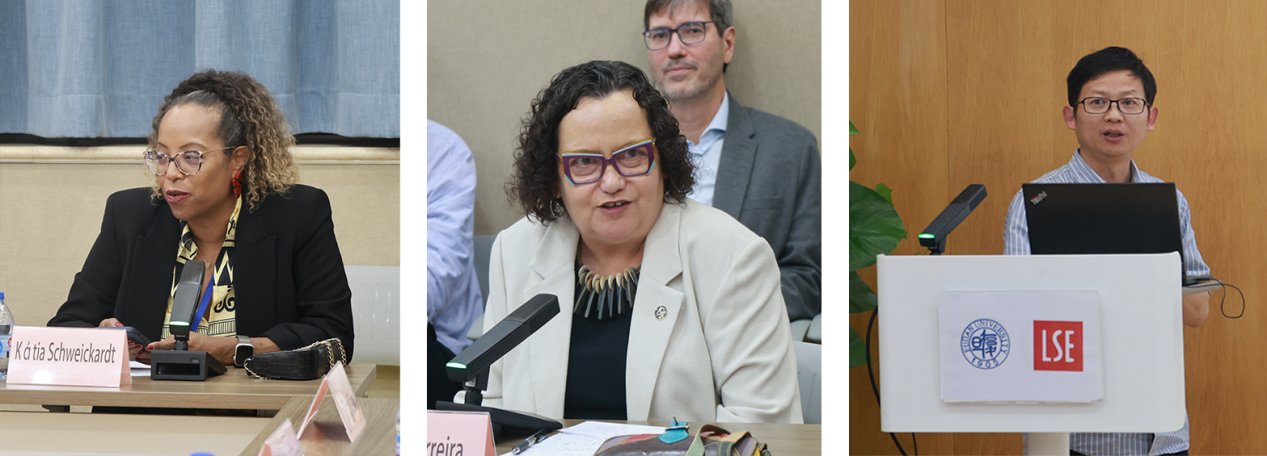
September 19, 2024, a seminar on the 50th anniversary of China-Brazil relations was held at the Institute of Global Public Policy (IGPP) of Fudan University. Augusto Pestana, Consul General of Brazil in Shanghai, Katia Schweickardt (Deputy Minister Level), Secretary-General of Basic Education of the Brazilian Ministry of Education, Márcia Serra, Director of Basic Education of the Brazilian Ministry of Education, Marcela Luciano Vilela de Souza, President of the Brazilian National Mathematics Teachers Association attended the seminar. Other attendees included Jing Yijia, Dean of IGPP of Fudan University, José Puppim, Chair Professor of Fudan University, Professor Huang Xingfeng of Shanghai Normal University, Associate Professor Cao Ting of the Institute of International Studies of Fudan University, as well as a delegation of middle school mathematics teachers from Brazil and other Chinese and Brazilian educational circles, Chinese and foreign students from the IGPP participated in the event.

The meeting was presided over by Professor José Puppim. At the beginning of the meeting, Professor Jing Yijia extended a warm welcome to the guests from Brazil and Shanghai on behalf of IGPP. He pointed out that this commemorative activity is particularly important in the current overall atmosphere of global geopolitics. In the past, some of our basic assumptions on global governance and international relations are now facing challenges, such as economic cooperation to create stable political relations, and globalization must be non-exclusive to achieve maximum utility. Under such circumstances, celebrating China-Brazil relations is of special significance, showing how two countries with great differences always seek common ground while reserving differences and developing harmoniously. He expressed his willingness to work with all walks of life in China and Brazil to continuously promote exchanges between the two countries in all aspects and build IGPP into a strategic base for China-Brazil cooperation in the field of higher education.

In his speech, Ambassador Augusto Pestana, Consul General of Brazil in Shanghai, reviewed the historical evolution of China-Brazil relations from the perspective of Shanghai. He showed a series of precious pictures left by the exchanges between the two sides around Shanghai since the establishment of the Consulate General of Brazil in Shanghai at the end of 19th century, including the interaction between New China and Brazil in the diplomatic field before the establishment of diplomatic relations between China and Brazil in 1974, and the development and changes of the Brazilian Consulate in Shanghai after the establishment of diplomatic relations.
At the meeting, Associate Professor Cao Ting of the Institute of International Studies of Fudan University delivered a keynote speech entitled 'China-Brazil Green Economy Cooperation: Reality and Prospect'. Professor Cao summarized in detail the cooperation achievements between China and Brazil in the field of green economy, including renewable energy, clean energy, green agriculture and green finance. She stressed that by strengthening top-level design, expanding market access, optimizing resource allocation and improving energy efficiency, China and Brazil will work together to promote the development of green economy and jointly meet the challenges of global climate change.

Then the meeting discussed the exchanges in the field of basic education, especially mathematics education. Professor José Puppim first introduced the background and situation of the visit of middle school mathematics teachers organized by the Brazilian Ministry of Education. Katia Schweickardt, Secretary-General of Basic Education of the Brazilian Ministry of Education, first thanked the Chinese government and Shanghai for their warm reception. She emphasized China's long-term commitment to taking education as its core development strategy and praised the outstanding performance of Chinese education in STEM and other fields. Then she introduced the progress of basic education in Brazil and pointed out that Brazil has made remarkable achievements in expanding the popularization of basic education. Especially in teachers' income, training level and social status. Brazil's performance in the Program for International Student Assessment (PISA) is lower than the average level, and the education field faces socio-economic, ethnic and regional differences. She praised the leaders of China and Brazil for their commitment to strengthening educational and scientific exchanges, and hoped to achieve deeper exchanges through educational cooperation in the future, especially in language learning and academic mobility. Márcia Serra, director of basic education of Brazil's Ministry of Education, emphasized the importance of teacher training, especially in the international context. She hoped to provide more Brazilian mathematics teachers with opportunities to study in other countries. China and Brazil have great potential in the exchange of mathematics teachers, including exchanging teachers, jointly holding training courses and carrying out academic cooperation.

During the free discussion session, the teachers and students at the scene had active and in-depth discussions on various issues of China-Brazil relations. Ambassador Augusto Pestana, Secretary Katia Schweickardt and other guests gave detailed and insightful responses to the questions raised by the teachers and students.
At the end of the meeting, Professor Jing Yijia made a concluding speech. He believed that this meeting reflected that China-Brazil relations had entered a stage of comprehensive exchanges and cooperation, and the cooperation in higher education and basic education discussed at the meeting reflected the depth and breadth of cooperation between the two sides. He believes that the essence of China-Brazil cooperation is the relationship between the two peoples. There are material exchanges but also spiritual exchanges. The key is how the two sides view each other and whether they like each other. At the same time, he pointed out that China-Brazil exchanges should be lofty, at the forefront, and create best examples, and believed that both sides already have such a foundation for development. He thanked all the guests again and wished everyone a fruitful stay in Shanghai. The seminar ended with warm applause.




